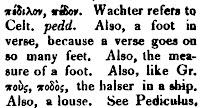Canister - word origin.
Canister (basket, vessel for liquids, container) comes from the Latin canistrum (wicker basket for bread, fruit, flowers, etc.), which is a transliteration of the Greek canistron/canastron (basket made from reed) from canna (reed; Gr: κάννα).
See also post 158 (etymology of cane) here.
.

In modern Greek:
a) canistro or canistra: canister [Gr: κάνιστρο or κανίστρα]
OED
___________________ Post 160. __________________________



Canister (basket, vessel for liquids, container) comes from the Latin canistrum (wicker basket for bread, fruit, flowers, etc.), which is a transliteration of the Greek canistron/canastron (basket made from reed) from canna (reed; Gr: κάννα).
See also post 158 (etymology of cane) here.
.

In modern Greek:
a) canistro or canistra: canister [Gr: κάνιστρο or κανίστρα]
OED
___________________ Post 160. __________________________



 .
.








 ____
____






















 .
.
 .
. .
.







